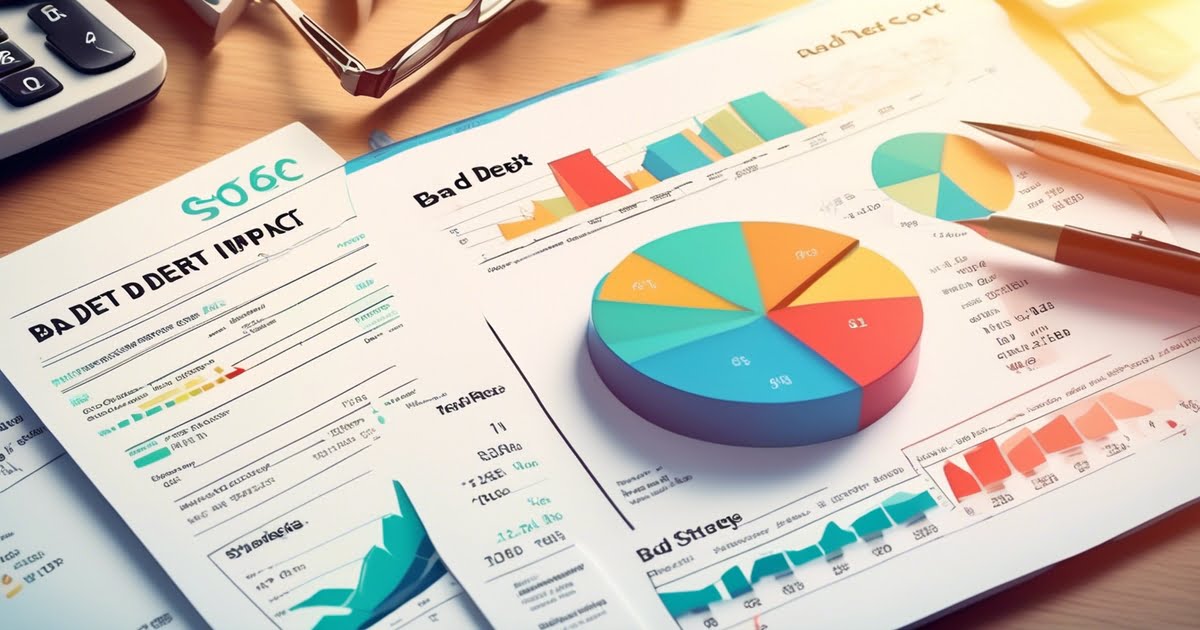Understanding the effect of unpaid debts on your credit score is essential for your financial health. Unpaid debts can dramatically lower your credit score, making it harder to get loans or good interest rates. By recognizing how unpaid debts impact your creditworthiness, you can take action to improve your financial situation.
Remember that your credit score is a reflection of your financial responsibility. Paying your bills on time and managing your debts effectively can help maintain a healthy credit score. If you’re struggling with bad debt, consider speaking with a financial advisor to explore options for resolving the issue and rebuilding your credit.
Key Takeaways
-
Understand the components of your credit score and how bad debt can significantly impact it.
-
Be aware of the negative effects of bad debt on your financial health, including higher interest rates and limited access to credit.
-
Take proactive steps to manage bad debt, such as negotiating with creditors and creating a realistic repayment plan.
-
Improving your credit score requires a combination of reducing bad debt, making timely payments, and monitoring your credit report regularly.
-
Prevent bad debt accumulation by budgeting effectively, avoiding unnecessary expenses, and seeking financial advice if needed.
-
Familiarize yourself with the legal aspects of debt management to protect your rights and ensure fair treatment in dealing with creditors.
Debt and Credit Basics
Defining Debt
Debt refers to money borrowed that needs to be repaid, either in full or through installments. Bad debt arises when funds are borrowed for non-appreciating items like vacations or excessive shopping. In contrast, good debt is used for investments like a home or education. Examples of bad debt include high-interest payday loans or maxed-out credit cards used for unnecessary purchases. Such debts can lead to financial distress, affecting one’s ability to save or invest for the future. The consequences of bad debt include damaged credit scores and limited access to favorable financial opportunities.
Good vs. Bad Debt
Good debt contributes positively to one’s financial health by helping build assets or investments that increase in value over time. For instance, taking out a mortgage to buy a home can lead to property appreciation and wealth accumulation. On the other hand, bad debt can result in financial instability due to high-interest rates and prolonged repayment periods. The benefits of good debt extend beyond personal finances, enabling individuals to secure loans at lower interest rates and access better credit card offers. In contrast, bad debt accumulation can spiral into a cycle of missed payments, defaults, and ultimately damage one’s credit score significantly.
Credit Score Fundamentals
A score shows how well a person pays bills. It is a number from 300 to 850. Credit bureaus use payment history, debt amounts, account age, new accounts, and loan types to calculate it. The higher the score, the lower the risk a lender takes. Lenders want to know if someone can handle debt and pay on time. A good score means better interest rates on loans or credit cards. It opens doors to affordable borrowing options. A credit score showcases creditworthiness based on a person’s financial track record. It holds significant weight in lending decisions and interest rate offerings.
Understanding Bad Debt
Characteristics
Bad debt can significantly impact credit scores, affecting financial opportunities and stability. Factors like payment history play a crucial role in determining creditworthiness. Late payments or defaults can lower credit scores.
credit utilization, the amount of credit used compared to the total available, is vital. High credit utilization ratios can signal financial distress to lenders, impacting credit scores negatively. Maintaining low credit card balances is essential.
Maintaining a good credit score is vital for financial stability. It enables access to better loan terms, lower interest rates, and higher credit limits. A good credit score reflects responsible financial behavior and enhances one’s overall financial health.
Sources
Credit cards and loans are common sources of bad debt that can harm credit scores. High-interest credit card debt can quickly accumulate, leading to financial strain and lower credit scores. Loans with unfavorable terms can also contribute to bad debt.
Different types of debt affect credit scores differently. Revolving debt, like credit cards, impacts credit utilization and payment history. Installment loans, such as car loans or mortgages, influence credit mix and payment history. Each type requires unique management strategies.
Effectively managing debt from various sources involves creating a budget, prioritizing payments, and negotiating with creditors if needed. Seeking professional advice from financial advisors or credit counselors can provide tailored strategies for debt management.
Impact on Scores
Bad debt can have a detrimental impact on credit scores, leading to decreased access to favorable financial products and services. Late payments, defaults, or collections can stay on credit reports for years, lowering scores significantly.
The correlation between debt management practices and credit score fluctuations is evident. Responsible debt management, such as making timely payments and reducing outstanding balances, can improve credit scores over time. Consistent efforts are key to rebuilding damaged credit.
Improving credit scores requires disciplined debt management practices. Setting up automatic payments, monitoring credit reports regularly for errors, and paying more than the minimum due each month are effective strategies for boosting credit scores gradually.
Credit Score Components
Payment History
Making your payments on time helps keep your credit score up. Missing payments or defaulting can seriously hurt your credit score. The effects can last for a long time. So, make sure you pay all your bills on time and in full.
RehumanizeTo keep up good payment history, you can set up automatic payments. Or set reminders for due dates. If you’re struggling with money, talk to your creditors about payment plans. Consistently meeting due dates will improve your credit bit by bit.
Missed payments stay on your report for years and really drag down scores. Deal with overdue payments quickly. Make on-time payments to show you’re responsible with money. That’s how you’ll rebuild credit over time.
Credit Utilization
RehumanizeLearning how much credit you’re using is really important. It shows how much of your total credit limits you are spending. It’s best to use less than 30% of your credit limits. Doing this proves you’re a responsible borrower and keeps your credit scores healthy.
To keep credit usage low, you can ask for higher limits or pay balances fully often. Don’t max out cards either. Use multiple cards evenly instead of one heavily. Keep balances minimal for ideal credit utilization ratios.
Maxing out cards makes lenders think you can’t manage money well, lowering credit scores. Watch spending closely and pay balances down regularly to avoid high utilization harming your credit.
Length of Credit History
The length of credit history plays a significant role in determining credit scores. Lenders assess how long individuals have been using credit to gauge their reliability as borrowers. A longer credit history reflects experience managing debt responsibly.
Building and maintaining a strong credit history involves keeping old accounts open, even if they are not actively used, to demonstrate a lengthy track record of responsible borrowing behavior. Closing old accounts abruptly can shorten the average age of accounts and potentially lower credit scores.
Individuals new to the world of credit should focus on establishing a solid foundation by opening a few accounts gradually and maintaining good payment habits over time. Consistent use of credit responsibly will contribute to the growth of a positive credit history.
New Credit
Opening new credit accounts can impact credit scores by triggering hard inquiries and altering the average age of accounts. While acquiring new lines of credit may offer benefits like increased purchasing power or rewards, it also poses risks such as overspending or accumulating excessive debt.
To manage new credit applications, individuals should space out their requests for new lines of credit, avoid applying for multiple accounts simultaneously, and carefully review terms and conditions before committing to new debts. Strategic planning when seeking new credits helps minimize potential negative effects on credit scores.
Applying for multiple new credits within a short period can raise red flags for lenders and indicate financial instability. It’s essential to weigh the benefits against the risks before pursuing additional lines of credit that could impact overall financial health.
Credit Mix
Diversifying one’s credit mix by having a combination of installment loans (e.g., mortgages) and revolving credits (e.g., credit cards) is beneficial for overall credit scores. Lenders view varied types of credits positively as it demonstrates an ability to manage different forms of debt responsibly.
Optimizing credit mix involves strategically balancing different types of credits based on individual financial goals and needs. Maintaining a healthy mix contributes positively towards building robust credit profiles that reflect diverse borrowing experiences.
Having only one type of account may limit opportunities for demonstrating strong financial management skills across various types of debts. By diversifying their portfolio with different forms of credits, individuals increase their chances of achieving higher overall credit scores.
Negative Effects of Bad Debt
Score Reduction
Credit scores can plummet due to bad debt resulting from missed payments or defaults on loans. This decline is influenced by payment history, credit utilization, and the length of credit history. A reduced credit score limits access to favorable loan terms and credit opportunities. To counter this, individuals must prioritize timely payments, lower credit card balances, and avoid opening multiple new accounts.
A decreased credit score can hinder one’s ability to secure loans, mortgages, or even rental agreements. Financial institutions view low credit scores as a risk indicator, leading to higher interest rates or outright denials. By addressing score reductions promptly through responsible financial habits, individuals can gradually rebuild their creditworthiness over time. Seeking guidance from financial advisors or credit counseling services can also aid in navigating the path to an improved credit score.
To mitigate the impact of bad debt on credit scores, individuals should focus on addressing loan denials promptly. Multiple loan rejections signal financial distress and increase the likelihood of continued credit score deterioration. By understanding the reasons behind these denials and taking proactive steps such as consolidating debts or negotiating payment plans, individuals can demonstrate improved financial stability to potential lenders. Building a positive payment history through consistent repayments is crucial in restoring trust with financial institutions.
Loan Denials
Loan denials stemming from bad debt can trigger a negative cycle affecting one’s creditworthiness. Lenders interpret frequent denials as an inability to manage debt responsibly, further damaging credit scores. Addressing these denials requires a comprehensive review of one’s financial situation and implementing corrective measures such as budgeting effectively and seeking debt consolidation options. By demonstrating a commitment to financial responsibility, individuals can enhance their chances of approval for future credit applications.
Multiple loan rejections not only impact current financial opportunities but also cast shadows on future borrowing prospects. Lenders may perceive applicants with a history of loan denials as high-risk borrowers, resulting in stricter terms or outright refusals for new credit applications. To break this cycle, individuals should seek professional advice on improving their credit profiles and developing sustainable repayment strategies tailored to their financial circumstances.
Higher Interest Rates
Bad debt often leads to increased interest rates on loans and credit cards due to the perceived risk associated with lending money to individuals with poor repayment histories. Higher interest rates translate into greater costs over the life of a loan, making it challenging for borrowers to manage their finances effectively. To alleviate this burden, individuals should prioritize paying off high-interest debts first and exploring options such as balance transfers or refinancing at lower rates.
Paying elevated interest rates due to bad debt not only strains finances but also prolongs the journey towards achieving financial stability. By adopting prudent debt management practices like creating a realistic budget, negotiating lower interest rates with creditors, and seeking professional assistance when needed, individuals can gradually reduce the financial burden imposed by bad debt. Improving one’s overall financial health through responsible borrowing habits is key to securing more favorable interest rates in the future.
Credit Card Implications
Utilization Impact
Credit utilization plays a crucial role in determining credit scores and influencing one’s ability to borrow. It refers to the ratio of credit used compared to the total credit available. High credit utilization can negatively impact credit scores, signaling potential financial distress. To optimize credit utilization, individuals should aim to keep their balances low relative to their credit limits.
Maintaining a low credit utilization ratio is key to a healthy credit score. By keeping balances below 30% of available credit, borrowers demonstrate responsible credit management. This shows lenders that they are not overly reliant on borrowed funds, thus improving their creditworthiness. Strategies such as paying off balances in full each month or requesting higher credit limits can help lower credit utilization and boost credit scores.
To ensure a positive impact on credit scores, individuals should regularly monitor their credit card balances and make timely payments. By staying mindful of their spending habits and managing their credit responsibly, borrowers can maintain optimal credit utilization ratios and secure better borrowing opportunities.
Late Payments
Late payments can have severe repercussions on credit scores and overall financial health. When individuals fail to make timely payments on their credit card accounts, they risk incurring penalties, facing increased interest rates, and damaging their credit scores. These consequences can further exacerbate existing debt issues and hinder future borrowing capabilities.
The negative effects of late payments extend beyond immediate financial penalties. They can linger on credit reports for years, impacting one’s ability to secure favorable loan terms or access new lines of credit. To avoid late payments, individuals should set up automatic payment reminders, establish a budgeting system, and prioritize bill payments to maintain a positive payment history.
By proactively addressing late payment issues and adopting responsible financial habits, borrowers can mitigate the adverse effects of late payments on their credit scores. Timely payments reflect positively on one’s financial discipline and help build a solid foundation for long-term financial stability.
Minimum Payments
Making only minimum payments on credit card accounts may offer temporary relief but can lead to long-term financial strain. While minimum payments ensure that borrowers meet the basic requirement set by the credit card company, they often result in accruing high-interest charges and prolonging debt repayment periods. This approach can negatively impact credit scores by signaling an inability to manage debt effectively.
By understanding the implications of minimum payments, individuals can make informed decisions about managing their finances responsibly. Paying more than the minimum amount due each month not only reduces overall debt but also demonstrates commitment to improving one’s financial well-being. By prioritizing larger payments whenever possible, borrowers can expedite debt repayment processes and enhance their credit scores over time.
To achieve lasting improvements in credit scores and overall financial health, it is essential for individuals to break free from the cycle of making minimum payments. By tackling debts proactively, seeking guidance from financial advisors if needed, and adopting prudent budgeting practices, borrowers can pave the way towards greater financial stability.
Handling Charge-Offs
Definition and Effects
Bad debt charge-offs occur when a creditor writes off an unpaid debt as a loss. This process typically happens after several months of missed payments by the borrower. Charge-offs have a significant negative impact on credit scores, making it harder to obtain credit in the future.
When a debt is charged off, it shows up as a derogatory mark on your credit report. These marks can stay on your report for up to seven years, dragging down your credit score and making it challenging to qualify for loans or credit cards at favorable terms. To address charge-offs, individuals can negotiate with creditors to settle the debt or set up payment plans.
To resolve charge-offs effectively, it’s crucial to tackle them promptly. Delaying resolution can worsen the impact on credit scores and financial health. By addressing charge-offs promptly, individuals can start rebuilding their credit history and improving their overall financial standing. Negotiating settlements or payment plans with creditors is key to mitigating the adverse effects of charge-offs.
Resolving Accounts
Resolving outstanding debts is vital for enhancing credit scores and financial well-being. By clearing off debts in collections or with creditors, individuals demonstrate responsibility and commitment to managing their finances effectively. Steps involved in resolving accounts include verifying the debt, negotiating repayment terms, and ensuring all agreements are documented.
Negotiating settlements with creditors involves reaching an agreement to pay a portion of the outstanding balance in exchange for considering the debt settled. Setting up payment plans allows individuals to gradually repay their debts over time while showing a positive effort towards honoring their financial obligations. Timely payments under these arrangements can help rebuild credit scores.
Preventing Future Charge-Offs
To prevent future charge-offs and debt collection actions, individuals should adopt proactive debt management practices. This includes creating a budget, tracking expenses, and prioritizing timely bill payments to avoid falling behind on financial obligations. Regularly reviewing credit reports can help identify potential issues early on.
Proactive debt management plays a crucial role in safeguarding credit scores and overall financial stability. By staying informed about one’s financial situation and taking steps to address any looming issues promptly, individuals can prevent unnecessary damage to their credit profiles. Early intervention in managing debts can significantly reduce the likelihood of facing charge-offs in the future.
Strategies for Bad Debt Management
Budgeting
Budgeting plays a crucial role in managing bad debt and improving credit scores. By creating a budget, individuals can track their expenses, identify areas where they can cut back, and allocate more funds towards paying off debts. This proactive approach helps in prioritizing debt payments and avoiding late fees or penalties. Developing a budgeting strategy involves listing all sources of income, categorizing expenses, setting realistic financial goals, and monitoring progress regularly.
A budget not only helps in managing day-to-day expenses but also enables individuals to plan for unexpected costs or emergencies. By having a clear overview of their financial situation, individuals can make informed decisions about how to allocate their funds effectively. Creating a budget provides a sense of control over one’s finances and promotes responsible spending habits. It serves as a roadmap towards achieving financial stability and reducing the impact of bad debt on credit scores.
Tips for developing an effective budgeting strategy include setting specific financial goals, distinguishing between needs and wants, exploring ways to increase income, such as taking up additional work or selling unused items, and reviewing the budget regularly to make necessary adjustments. Utilizing budgeting tools or apps can also streamline the process and provide visual representations of spending patterns. By adhering to a well-structured budget, individuals can take proactive steps towards managing bad debt effectively and improving their overall financial well-being.
Debt Consolidation
Debt consolidation involves combining multiple debts into a single loan with a lower interest rate. This approach simplifies debt repayment by consolidating various payments into one monthly installment. It can help individuals streamline their finances, reduce the risk of missing payments, and potentially save money on interest charges over time. Debt consolidation is particularly beneficial for those juggling multiple high-interest debts or struggling to keep track of different payment deadlines.
When considering debt consolidation options, individuals should evaluate factors such as the total amount of debt owed, current interest rates on existing debts, any associated fees with the consolidation process, and the new interest rate offered by the consolidation loan. Comparing these details can help determine whether debt consolidation is a viable solution for managing bad debt effectively. It is essential to choose a reputable lender or financial institution that offers favorable terms and conditions for the consolidation loan.
Factors to consider when evaluating debt consolidation options include assessing one’s ability to meet the new consolidated loan payments comfortably without straining finances further. Individuals should also be cautious about potential risks associated with debt consolidation, such as accruing more debt if spending habits are not addressed concurrently. By approaching debt consolidation thoughtfully and strategically, individuals can leverage this method as a tool for improving their financial health and working towards better credit scores.
Negotiating with Creditors
Negotiating with creditors is another effective strategy for addressing outstanding debts and finding viable solutions to resolve financial challenges. When communicating with creditors about bad debts or overdue payments, it is crucial to maintain open lines of communication and demonstrate willingness to cooperate towards finding mutually beneficial resolutions. Effective negotiation skills can lead to reduced interest rates, extended payment deadlines, or even partial forgiveness of certain debts.
Tips for successful negotiations with creditors include being honest about one’s financial situation, proposing feasible repayment plans based on available resources, seeking professional guidance from credit counseling services if needed, and documenting all agreements reached during negotiations. Establishing clear communication channels with creditors helps in building trust and fostering positive relationships that can lead to amicable resolutions regarding outstanding debts.
Improving Your Credit Score
Timely Payments
Making timely payments is crucial for maintaining a healthy credit score. By paying bills on time, individuals demonstrate reliability and financial responsibility. Consistent on-time payments positively impact creditworthiness and signal trustworthiness to creditors. To ensure timely payments, setting up automatic bill pay or calendar reminders can be effective strategies. Missing payments can lead to negative marks on credit reports, affecting credit scores significantly.
Reducing Debt Load
Reducing debt load plays a vital role in improving credit scores. Lowering outstanding balances decreases the credit utilization ratio, which is a key factor in credit scoring models. Prioritizing debt repayment by focusing on high-interest debts or utilizing debt snowball methods can expedite the process of reducing debt. Responsible financial management not only enhances credit scores but also leads to long-term financial stability and security.
Limiting New Credit Applications
Frequent new credit applications can have adverse effects on credit scores. Each new application results in a hard inquiry on the credit report, which can lower the score temporarily. Multiple inquiries within a short period may indicate financial instability to lenders, potentially impacting creditworthiness. To protect credit scores and overall financial health, individuals should limit unnecessary new credit applications and only apply for credit when needed.
Preventing Bad Debt Accumulation
Financial Planning
Financial planning plays a crucial role in managing debt effectively and enhancing credit scores. By creating a budget, individuals can track their income and expenses to avoid overspending. This proactive approach helps in identifying areas where cutbacks can be made to allocate funds towards debt repayment.
Establishing short-term and long-term financial goals is essential in maintaining financial stability. Setting achievable objectives, such as paying off credit card balances or saving for emergencies, provides a roadmap for financial success. Through regular monitoring and adjustments to the financial plan, individuals can stay on track towards improving their credit scores.
Proactive financial planning not only aids in debt management but also secures overall financial well-being. By prioritizing savings, investments, and debt repayments within the budget, individuals can build a strong financial foundation. This foundation acts as a buffer against unforeseen expenses that may lead to bad debt accumulation and negatively impact credit scores.
Emergency Funds
Building emergency funds is vital for ensuring financial security and safeguarding against unexpected expenses. Having a designated fund set aside for emergencies helps individuals cover unforeseen costs without resorting to borrowing money or accumulating debt. This practice not only protects credit scores but also provides peace of mind during challenging times.
Emergency funds serve as a safety net during periods of financial instability or crises. By having readily accessible funds for emergencies, individuals can avoid relying on high-interest loans or credit cards to meet urgent needs. Regular contributions to the emergency fund ensure its continual growth, enabling individuals to address unexpected expenses without disrupting their financial goals.
To establish and maintain emergency funds effectively, individuals should prioritize saving a portion of their income each month. Automating contributions to the emergency fund ensures consistency and discipline in building this financial cushion. By setting realistic savings goals based on monthly expenses, individuals can gradually grow their emergency fund while protecting their credit scores from sudden shocks.
Understanding Terms and Conditions
Understanding credit terms and conditions is essential for responsible borrowing practices and avoiding bad debt accumulation. Familiarity with the terms outlined in loan agreements or credit card contracts enables individuals to make informed decisions regarding borrowing limits, interest rates, and repayment schedules. This knowledge empowers borrowers to manage their debts wisely and prevent negative impacts on their credit scores.
By reviewing credit terms and conditions thoroughly before agreeing to any financial arrangement, individuals can identify potential risks or hidden fees associated with borrowing. Clarity on repayment obligations helps borrowers plan their finances effectively to ensure timely payments and avoid penalties that could harm their creditworthiness. Taking the time to understand the fine print of credit agreements is a proactive step towards maintaining healthy credit habits and preserving one’s credit score.
Comprehending the implications of various credit terms allows individuals to assess the affordability of loans or lines of credit accurately. By analyzing factors such as annual percentage rates (APRs) and payment due dates, borrowers can make informed choices that align with their financial capabilities. This understanding not only promotes responsible borrowing behavior but also contributes to long-term financial well-being by preventing excessive debt burdens that may impact credit scores negatively.
Legal Aspects of Debt Management
Statute of Limitations
The statute of limitations refers to the timeframe within which creditors can legally sue individuals for unpaid debts. Once this period expires, creditors lose the right to take legal action. Understanding this is crucial as expired statutes protect debtors from lawsuits related to old debts. It’s typically around 3-10 years, varying by state and debt type.
Knowing the statute of limitations on debt is essential for protecting oneself from potential legal actions. When a debt reaches its statute of limitations, creditors can no longer sue for payment. This limitation also prevents them from reporting the debt to credit bureaus, positively impacting credit scores. However, making any payment on an expired debt can reset the clock on the statute.
Individuals should be aware that even though debts may be time-barred due to the statute of limitations, they remain on credit reports for 7 years from the date of delinquency. After this period, they must be removed in compliance with federal laws like the Fair Credit Reporting Act (FCRA). Monitoring credit reports regularly helps ensure that outdated debts are not negatively impacting credit scores.
Validating Account Ownership
Validating account ownership involves requesting proof that a creditor or collection agency has the legal right to collect a specific debt. This process is vital when disputing inaccurate information on credit reports. Requesting validation ensures that only legitimate debts are reflected in credit histories, preventing wrongful damage to credit scores.
When disputing a debt, individuals can send a validation letter to creditors or collection agencies asking for proof of account ownership. If these entities fail to provide valid documentation within 30 days, they must cease collection efforts and remove the disputed item from credit reports. This verification process helps maintain accurate credit information.
Ensuring account ownership validation is crucial as inaccuracies can harm credit scores and financial standing. Incorrectly reported debts may lower creditworthiness and lead to higher interest rates on loans or denial of credit applications. By verifying account ownership, individuals safeguard themselves against erroneous negative entries affecting their credit profiles.
Confirming Payment Status
Confirming payment status involves verifying that resolved debts are accurately reflected on credit reports. Ensuring that payments are updated correctly post-settlement is vital for maintaining good credit standing. Inaccurate reporting can lead to lower credit scores and difficulties in obtaining future loans or lines of credit.
Verifying payment status prevents discrepancies in credit reports that could impact one’s financial reputation negatively. Checking that settled accounts show as “paid” or “settled” ensures that creditors report accurate information to credit bureaus. Regularly reviewing credit reports allows individuals to catch any errors promptly and take steps to rectify them for improved credit health.
To avoid potential issues with incorrect payment reporting, individuals should keep detailed records of all communications with creditors regarding settlements. Maintaining documentation such as settlement letters and receipts can serve as evidence in case disputes arise over payment statuses later on. By staying vigilant about confirming payment status, individuals protect their credit scores from unnecessary harm.
Closing Thoughts
Understanding the impact of bad debt on your credit score is crucial for maintaining financial health. By grasping the nuances of bad debt, credit score components, and strategies for management, individuals can proactively navigate potential pitfalls. Recognizing the negative effects of bad debt and implementing measures to handle and prevent it are key steps towards improving one’s credit standing. Legal aspects of debt management further underscore the importance of informed decision-making in financial matters. Moving forward, applying the insights gained from this exploration can empower individuals to make sound financial choices and safeguard their creditworthiness.
For those seeking to fortify their financial well-being, taking proactive steps to manage bad debt and enhance their credit score is paramount. Educating oneself on these intricacies and adopting prudent financial habits can pave the way for a more secure financial future. Remember, knowledge is power when it comes to safeguarding your financial reputation and stability.
Frequently Asked Questions
How does bad debt affect your credit score?
Bad debt can significantly lower your credit score as it indicates financial irresponsibility. It leads to negative marks on your credit report, affecting your ability to get loans or credit cards in the future.
What are some strategies for managing bad debt effectively?
Effective strategies for managing bad debt include creating a budget, negotiating with creditors, consolidating debt, and seeking help from credit counseling services. Prioritize paying off high-interest debts first to reduce overall financial burden.
Can bad debt be removed from your credit report?
While accurate negative information generally remains on your credit report for several years, you can work towards improving your credit score by paying off debts and practicing good financial habits over time. Disputing inaccuracies with credit bureaus is also an option.
How can one prevent accumulating bad debt?
To prevent accumulating bad debt, individuals should create a realistic budget, avoid unnecessary expenses, track spending habits, build an emergency fund, and use credit responsibly. Regularly reviewing financial statements and seeking professional advice can also help maintain healthy finances.
Are there legal aspects to consider in managing debt?
Legal aspects of debt management include understanding consumer rights, dealing with collection agencies within legal boundaries, being aware of statutes of limitations on debts, and seeking legal advice if facing lawsuits or considering bankruptcy. Compliance with relevant laws is crucial in navigating debt-related issues.






